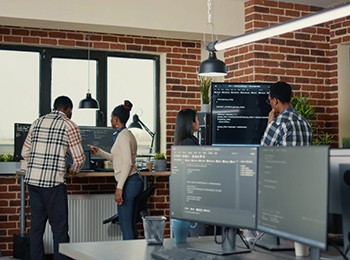23 Sep 2023

In the ever-evolving landscape of software development, the importance of collaboration cannot be overstated. One of the most effective ways to harness the collective intelligence of a development team is through collaborative code analysis. This practice not only enhances code quality but also fosters a culture of learning, innovation, and teamwork. Let’s explore the significance of collaborative code analysis and how it empowers software development teams.
What is Collaborative Code Analysis?
Collaborative code analysis involves multiple developers working together to review, evaluate, and improve code. This process typically takes place in a shared environment, such as a meeting room with a large screen or virtually through collaborative tools. The goal is to leverage the diverse perspectives and expertise of team members to enhance code quality, identify potential issues, and share knowledge.
Benefits of Collaborative Code Analysis
Enhanced Code Quality
When developers collaborate on code analysis, they bring different skill sets and experiences to the table. This diversity allows for a more thorough examination of the code, leading to the identification of bugs, inconsistencies, and areas for improvement. The collective scrutiny results in higher-quality code that is more robust and maintainable.
Knowledge Sharing and Skill Development
Collaborative code analysis provides an excellent opportunity for knowledge transfer among team members. Less experienced developers can learn from their more seasoned colleagues, gaining insights into best practices, coding standards, and problem-solving techniques. This mentorship fosters a culture of continuous learning and development within the team.
Fostering Team Cohesion
Engaging in collaborative code analysis helps strengthen team dynamics. As developers work together to review code, they build relationships and trust, leading to improved communication and collaboration in future projects. This sense of camaraderie enhances team morale and contributes to a positive work environment.
Real-Time Problem Solving
Collaborative code analysis allows for real-time discussions and brainstorming sessions. When developers encounter challenges or complex issues, they can collectively brainstorm solutions on the spot. This immediacy accelerates problem-solving and reduces the time spent on debugging and fixing errors.
Best Practices for Effective Collaborative Code Analysis
Establish Clear Objectives
Before starting a collaborative code analysis session, it’s essential to define clear objectives. Are you focusing on identifying bugs, improving readability, or adhering to coding standards? Having a shared understanding of the goals will keep the discussion focused and productive.
Utilize Collaborative Tools
Leverage collaborative tools that facilitate code review and analysis. Platforms like GitHub, GitLab, and Bitbucket offer features that allow teams to comment on code, track changes, and discuss revisions. These tools enhance communication and streamline the analysis process, especially for remote teams.
Encourage Open Communication
Foster an environment where team members feel comfortable sharing their thoughts and opinions. Encourage constructive feedback and make it clear that all contributions are valued. This openness will lead to more fruitful discussions and a stronger sense of ownership over the code.
Rotate Roles
To maximize the benefits of collaborative code analysis, consider rotating roles within the team. Allow different developers to take the lead in presenting their code for review. This practice not only diversifies perspectives but also gives everyone a chance to contribute and learn from one another.
Document Findings and Actions
After each collaborative code analysis session, document the key findings, decisions made, and action items. This documentation serves as a reference for future sessions and helps ensure that lessons learned are not forgotten. It also provides a valuable resource for onboarding new team members.
Conclusion
Collaborative code analysis is a powerful practice that can significantly enhance the software development process. By leveraging the collective knowledge and expertise of the team, developers can produce higher-quality code, foster a culture of learning, and strengthen team dynamics. In a world where technology is constantly evolving, embracing collaboration is essential for staying ahead of the curve. So gather your team, dive into that code, and unlock the full potential of collaborative code analysis!
Get the updates, offers, tips and enhance your page building experience
Up to Top